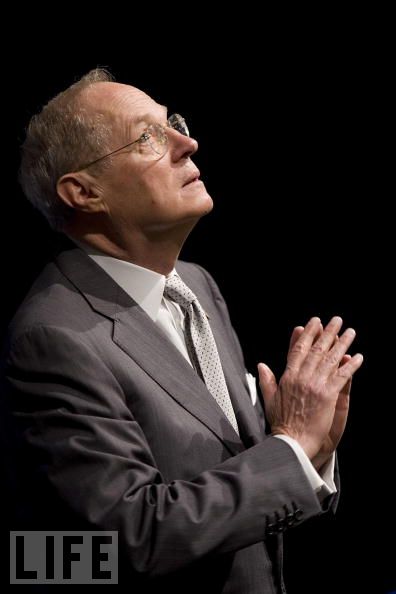Can Justice Kennedy be Manipulated?
 Scott Lemieux notes something that I also noticed in the reporting on the Kagan nomination: the idea that part of the reason that Obama nominated her was that she might be able to influence Justice Anthony Kennedy.
Scott Lemieux notes something that I also noticed in the reporting on the Kagan nomination: the idea that part of the reason that Obama nominated her was that she might be able to influence Justice Anthony Kennedy.
Scott notes, for example, TNR’s Jeffrey Rosen: “Obama has signaled that he wants a justice who can win Justice Anthony Kennedy to the liberal side of the Court in 5-4 votes. Given Kagan’s demonstrated success winning over skeptical conservatives at every stage of her career, she seems ideally suited for this role.”
However, like Scott I am unclear on the empirical evidence the Kennedy is some wishy-washy fellow waiting to be persuaded, or for that matter, whether Kagan is some sort of super-saleswomen when speaking to conservatives.
Scott asks:
Is there any evidence whatsoever that Kennedy is susceptible to lobbying for votes, subtle or otherwise? A fairly large literature has emerged about the internal workings of the Rehnquist Court, and I’ve read a painfully high percentage of it, but I’m not aware of any documented case in which the influence of another justice has caused Kennedy to switch his views.
He then correctly notes:
some Court observers conflate moderation with indecisiveness. Just because a justice’s votes are less predictable than some of their colleagues’ doesn’t mean that they are to be subject to manipulation.
Indeed.
Being more moderate than, say, Justice Alito, does not mean that Kennedy sits around waiting to be led by the nose. In fact, it strikes me as odd that anyone assumes that a person occupying one of the most elite positions in the American government would be so easily manipulated. To modify a David Letterman catch-phrase: they don’t give those jobs to chimps.
Photo: LIFE
As currently constituted, Kennedy is the pivot on which the Court rests. It’s in Obama’s short-term interest to appoint justices just to the Left of Kennedy and hope that they can forge a five-vote majority. This strategy makes more sense than Greenwald’s desire for a Clarence Thomas on the Left, someone so dogmatic and ideological that they take no real part in the debate.
(On the long-term, Democrats are probably missing out on an opportunity to appoint someone more liberal with a near-filibuster proof Senate)
You’ve got to wonder how Kennedy feels when he reads stuff like this……..
He feels important. Which is the point. This kind of thing is flattering. When one person has that much power, then you cater to their ego. Lemieux hates the Kagan pick, so he (along with Campos and Greenwald) is just throwing stuff against the wall to see what sticks. But “lobbying” is the operative word here, not “manipulated”. People who think a lot of themselves enjoy it when others ask them for things.
This issue is not swaying Kennedy, so much as the ability to craft argument that he might agree with. PD’s analysis is on point. Ultimately justices need to vote one way or the other, and the issue is which argument they agree with more. (and yes, I know, they can concur and dissent independently, etc.)
I have no opinion on whether Kennedy can be easily persuaded. However, it appears that Kagan hasn’t tried that hard to do so ( http://althouse.blogspot.com/2010/05/how-good-will-elena-kagan-be-at.html ):
Max, that exchange is interesting, but I have two reservations:
1. Kennedy usually occupies the swing seat, but not in the United Citizens case. Kennedy had previously voted that McCain Feingold was an unconstitutional restriction on Free Speech. His vote probably was never obtainable.
2. Kagan was brought in on the re-argument of the case after the first solicitor general screwed it up. I’m not sure what that means, but it was an odd (re)argument.
If she’s only argued five times in court, then the more natural assumption is that she is not experienced in this area; not that she wouldn’t be able to forge consensus in a more collegial environment with fellow justices or draft written opinions to that effect.